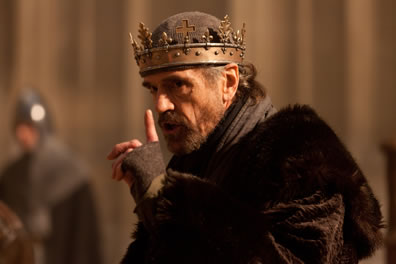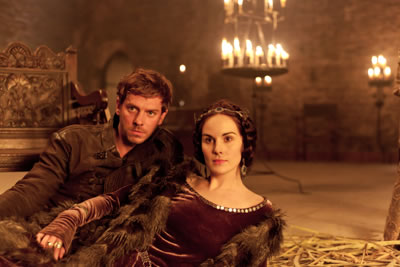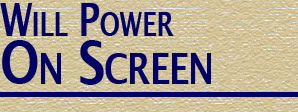The Hollow Crown: Henry IV, Part One
Irons' Henry IV Reigns O'er His Own Play
Neal Street Productions, NBC/Universal International, WNET THIRTEEN (2012)
Directed by Richard Eyre. Jeremy Irons, Tom Hiddleston, Simon Russell Beale, Joe Armstrong, Alun Armstrong, Julie Walters, David Hayman, Michelle Dockery

Jeremy Irons as King Henry IV makes a point in a scene from Henry IV, Part One, part of The Hollow Crown series of Shakespeare history plays being broadcast on PBS. Below, Hotspur (Joe Armstrong) and Lady Percy (Michelle Dockery) in Glendower's court. Photos by Joss Barratt, Neal Street Productions.
Sam Mendes and Pippa Harris, co-executive producers of The Hollow Crown under the auspices of their company, Neal Street Productions, made an interesting decision when they set out to film for TV broadcast William Shakespeare's second history tetralogy, Richard II, Henry IV Parts One and Two, and Henry V: They assigned a different director to each king's reign.
With The Hollow Crown, airing Friday nights on PBS beginning Sept. 20 (check local listings), now handed off from Rupert Goold to Richard Eyre for the two parts of Henry IV, we get not only a different production aesthete but a different approach to Shakespeare, too. Eyre has more respect for the text than his predecessor in the series. He tells the story of Henry IV, Prince Hal, Falstaff, and the Percys that Shakespeare wrote, and he uses the playwright's allegorical arcs to drive this earthy, action-packed drama. What hasn't changed from director to director is the caliber of acting talent.
Or, if anything, it's risen a couple of notches thanks to two performances: Tom Hiddleston as Prince Hal and Jeremy Irons in the title role. I'm ever hesitant to label as definitive any performance of a certain role, but let me present the case for Irons' Henry. In a play that features such incredibly drawn characters as Falstaff, Hal, Hotspur, Glendower, Douglas, Worcester, and even Poins, the king pales in comparison and can easily fade to bland in many productions. In this version, Henry dominates thanks to Irons' skills. He is electric throughout, and the scenes of this production that leave lasting impressions in the days after viewing are Henry's opening court scene, his interview with Hotspur, his interview with Hal, and the play-acting scene in the Eastcheap tavern when Hiddleston as Hal does a spot-on imitation of Irons as Henry.
Irons finds specks of valuable gems in individual lines that even good actors can overlook and, through these, he portrays an oily king, the kind of politician who can seem to be a genuine best-buddy confidant while his scorpion sting hovers still. In the opening scene when he introduces Blunt and his news, Irons speaks the speech's first line, "Here is a dear and true industrious friend," then turns to Blunt with a prompting eye for this "friend's" name. As Blunt whispers it, Irons continues: "Sir Walter Blunt, new lighted from his horse." In the second court scene, Hotspur (Joe Armstrong) launches into his first line like cannon fire, eliciting a gentle "sh-sh-sh" from the king who fatherly coaxes the young northern lord into a calmer reckoning. Two things of note happen during the ensuing popinjay speech: Henry pauses in front of one of his sons, a moment of shared admiration for Hotspur, and then he laughs appreciatively at Hotspur's telling his tale. This lulls the young lord into his comfort zone, sure of his footing. Too sure, for a simple passing expression between Hotspur and his father Northumberland (Joe's real-life father, Alun Armstrong) that Henry happens to catch unsheaths the king's sudden vitriole.
Yet, one key piece of truth seems to seep through this king's countenance: he misses his eldest son. Embarrassed by Hal's behavior, this Henry certainly is, but Irons reveals that Henry mostly wants to see his son around the court. "Not an eye but is a-weary of thy common sight—save mine," he tells Hal in their palace interview, the pause coming with the start of the next line in the text, but Irons then shifts into confessionary tone as he continues: "which hath desired to see thee more." Hiddleston's Hal, uncomfortable with this revelation (or perhaps not believing it), replies with a snarky, "I shall hereafter, my thrice-gracious lord, be more myself," and receives a resounding slap across the face.
Hiddleston's portrayal of Hal is richly aware, as well. This is a Hal who misses his father, too, so he searches for surrogates wherever he can, and Falstaff (Simon Russell Beale) seems just as wise and certainly a lot more fun. Hal also prefers the simple life. This prince will, two plays hence as king himself, ask in soliloquy "What infinite heart's-ease must kings neglect, that private men enjoy? And what have kings, that privates have not too, save ceremony, save general ceremony?" Though, ironically, Hiddleston does not get to speak that soliloquy when he is playing the titular Henry V in The Hollow Crown's final installment, that sentiment informs his Hal. He is comfortable in Eastcheap, and his "I know you all" speech is given in voice-over as he strolls through the tavern and out into the alley, casually interacting with people who pay him little if any ceremony, though he gets a few double takes from upper-class people he passes. Yes, Hal is talking of his eventual rise to glory in this speech, but here it comes across as acknowledging the inevitability of his birthright, not something he plans to do by design. This production achieves a revealing moment when, at the tavern, Hal receives the news of the northern rebellion with realization that his birthright's dangers and responsibilities are finally and suddenly at hand. Falstaff notices this dark mood settling on the prince's countenance, so he suggests play-acting the interview with the king as a method for Hal to ease his way into his new world.
However, Hal's real moment of truth comes when his father calls him "my near'st and dearest enemy" in their real interview. "Do not think so," Hal cries out. "You shall not find it so." Hiddleston's earnestness here yet has a tinge of self-doubt. But as this speech builds, so does Hal's confidence, how he will "exchange [Hotspur's] glorious deeds for my indignities." Replies Henry, "A hundred thousand rebels die in this," which Irons speaks as if it's simple father's logic, and this clearly moves Hiddleston's Hal as we see acceptance of responsibility—and his father's buried love, too—fill his eyes. Thereafter, Hal continues his bonhomie nature, but goes about his state business with seriousness and forms a new bond with his brother, John. The future King Harry Five has just been begot.
Falstaff's moment of truth, of course, comes in that play-acting scene, but seldom is the moment rendered so powerfully as Beale and Hiddleston play it. Beale's Falstaff is a dwarf transplanted from Middle Earth: short, round, and effusively bearded, and he has the opportunistic regard of a man who mines every element of his landscape for his prosperity. The first scene finds him in bed with Doll Tearsheet (a character borrowed from Henry IV, Part Two), and as he and Hal interact, he urinates, perhaps a bit of insider wink at Anthony Quayle's wonderfully wise Falstaff in the 1979 BBC/Time-Life version (Eyre set out to film the antidote to that series' stilted representation of these plays). As good a performance as he gives, Beale as Falstaff is not the loveable rogue until we get to the play-acting scene. It's all good fun through to the scene's climax: "For sweet Jack Falstaff, kind Jack Falstaff, true Jack Falstaff, valiant Jack Falstaff, and therefore more valiant, being, as he is old Jack Falstaff, banish not him thy Harry's company, banish not him thy Harry's company: banish plump Jack, and banish all the world." Beale's Falstaff speaks this as a man both wanting to be what he describes—yet knowing he isn't, except old and plump—and fearing the truth. Eyre holds the camera on Beale watching, with growing concern, Hal's inability to answer. We see in Hiddleston a growing realization. He tries to laugh it off: "I do," he says with an unconvincing chuckle, and then looks back unwillingly at Falstaff: "I will." Sadness, the kind that comes from a truth that can't be willed away, passes from Hal's eyes to Falstaff's, to yours.
Yet, Falstaff doesn't take heed. Even at the end of the play when he claims to have killed Hotspur and robs Hal of the path to glory the prince so arduously set out, Falstaff clearly loses all real affection from the prince. And Beale's Falstaff knows it, too, but he sets any concern aside as he ponders the notion that he might yet gain wealth and fame via his gross lie, and that satisfies him enough.
No performance in this production is less than stellar, but it's worth highlighting the work of Joe Armstrong, under Eyre's direction, in the interpretation of Hotspur because it doesn't go off the rails as I've seen too many Hotspurs do. Armstrong gives us the impetuously valiant yet comically self-centered Hotspur that Shakespeare so clearly wrote. Eyre uses cinematic technique to ramp up Shakespeare's depiction of Hotspur's simmering ire toward the king. On the stage, Shakespeare has the king and his court exit, leaving Hotspur and Northumberland alone on stage. But because the court is not likely to leave the throne room, Eyre has Hotspur and Northumberland depart, and with the camera still on Henry and his court we can hear Hotspur yell from out in the hall regarding his prisoners that the king demands, "An if the devil come and roar for them, I will not send them."
 Hotspur's wife, Lady Percy (a gleam-eyed Michelle Dockery) is just as fiery as he and gets just as annoyed as her husband with the Welsh antics of Glendower's court. Hotspur is physically rough with her, but she gives as good as she gets, their relationship both violent and sexually charged. While he reads the letter from the "frosty-spirited rogue" lord out in the hall, we discover that she, exasperated, is still in bed, and when Hotspur talks with the servant about his horse, Lady Percy, still nude, gets out of the bed to the delight of the servant, though Hotspur is oblivious to this servant's voyeurism, being himself so enamored of a horse in his imagination.
Hotspur's wife, Lady Percy (a gleam-eyed Michelle Dockery) is just as fiery as he and gets just as annoyed as her husband with the Welsh antics of Glendower's court. Hotspur is physically rough with her, but she gives as good as she gets, their relationship both violent and sexually charged. While he reads the letter from the "frosty-spirited rogue" lord out in the hall, we discover that she, exasperated, is still in bed, and when Hotspur talks with the servant about his horse, Lady Percy, still nude, gets out of the bed to the delight of the servant, though Hotspur is oblivious to this servant's voyeurism, being himself so enamored of a horse in his imagination.
Eyre's presentation is full of such details, some extratextual. King Henry orders the lords to leave the room when he interviews Hal, but then he insists with gesture that his other sons remain to watch their eldest brother's dressing down. The battle of Shrewsbury is total chaos: you can barely make out individual characters. It's all flailing weapons, falling men, and dying in mud. One of Eyre's choices I question is that though Falstaff gives his soliloquy about his ragged army to the camera, his famous soliloquy on honor is done as voice-over while he walks through the English camp—a little touch of Jack in the night.
Eyre, ever aware that his medium is film and not the stage, interweaves scenes with effective editing (most notably the first two scenes, Henry at court and Hal in Eastcheap), and he moves some scenes around without dire effects on the narrative. In getting the production down to two hours, he chooses to trim within scenes rather than cut chunks, though unfortunately we lose the scene of Hal saving his father in the battle. Another element of the play largely left on the editing floor is the play's comedy. What we get of Hal and Falstaff and of Hotspur and Lady Percy is funny; but overall, this version of Henry IV, Part One, is not a raucous comedy. It is historical drama, richly told in Shakespeare's verse, effectively filmed under Eyre's direction, and superbly acted by Irons and Hiddleston, et al.
Eric Minton
September 11, 2013
Comment: e-mail editorial@shakespeareances.com
Start a discussion in the Bardroom



 Find additional Shakespeareances
Find additional Shakespeareances